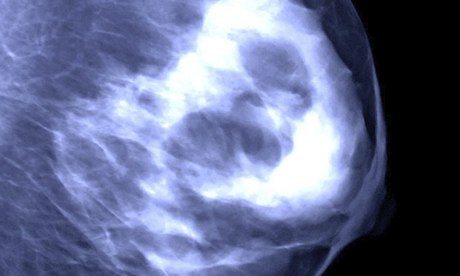
Researchers believe they have identified a molecule that could be key to preventing over-treatment of breast cancer by revealing when the early stage of the disease is likely to develop into its invasive form.
Over-diagnosis and over-treatment has become a contentious issue, provoking impassioned argument between epidemiologists. Some have gone so far as to argue that the harm caused by needless diagnosis and damaging treatment for cancerous cells that would have gone away or never progressed to disease in the woman's lifetime outweighs the number of lives saved.
But the Breast Cancer Campaign says that a routine test could spare women the difficult decision on whether to have treatment after research funded by the charity found that the molecule alpha v beta 6 could tell doctors which cases of ductal carcinoma in situ (DCIS), a condition in which non-invasive cancerous cells are contained within the milk ducts of the breast, are most likely to develop into early invasive breast cancer.
Study co-author Professor Louise Jones said: "You have a chance you can watch and monitor [where the molecule is not present].
"We often pick this [DCIS] up in screening, which means that women are 50 or older and if it takes 30 years for that disease to progress, watching and waiting might be a sensible way to go. It's difficult for women to accept that they might need to have a mastectomy for something that you don't know is going to harm them."
She hopes to validate the results in further research and that a test for use in clinics could then be developed.
Around 4,800 cases of DCIS are diagnosed each year in the UK, two-thirds of them through breast screening. If left untreated up to half could progress into invasive breast cancer, but it is currently not possible to say which ones.
Jones and Dr Michael Allen, at Queen Mary University of London's Barts Cancer Institute, looked at 583 breast tissue samples from normal breasts and those with DCIS. They showed a link between levels of alpha v beta 6 in cells which form part of the milk duct walls (myoepithelial cells) and whether breast tissue was normal, had DCIS or had progressed to invasive breast cancer.
Almost no alpha v beta 6 was found in cells from normal tissues, whereas over half of the DCIS cases had alpha v beta 6 in the surrounding cells and nearly all DCIS cases that had already started to become invasive breast cancer had alpha v beta 6.
Examining a further 104 cases of DCIS matched to long-term follow-up information they found that women whose myoepithelial cells contained alpha v beta 6 saw their disease recur on average around nine years earlier than those without alpha v beta 6 (after 2.3 years compared to 11).
Lady Morgan, chief executive of the Breast Cancer Campaign, which urges women to go for screening, said development of a reliable test would signal "a pivotal moment in the diagnosis and treatment of breast cancer".
"Women with DCIS … would no longer face the agonising choice between risking their breast cancer becoming invasive or facing treatment without knowing whether their DCIS will become life-threatening or not," she said.
Professor Clare Isacke, from the Institute of Cancer Research, London, said the research was "potentially very important" because it was one of few papers that deal with early stage lesions and showed that "this integrin [alpha v beta 6] is a biomarker [biological marker] of those DCIS cases that are going to do worse".
Case study
Linda French, from Oxford, was 58 when she something irregular was discovered during a routine mammogram in November last year. As the tests progressed, she said every time she went to the clinic with her husband "the odds went further against me".
When she was diagnosed with DCIS, she said the hospital asked her whether she had heard the negative press around treatment of DCIS.
"We were told 'We really don't know, out of people who have this, who is going to go on and get aggressive breast cancer and who isn't'."
French said she was offered everything from a complete left breast mastectomy to the lump being removed, although they said a mastectomy would be "quite severe".
She opted to have the lump removed and went into hospital on 29 January. She was told on 13 February that the surrounding area was clear of cancer but radiation treatment was suggested as an "insurance policy".
French agreed to have the treatment, which spanned 15 sessions over three weeks. She said for her the decision was guided by what the experts said.
"If they'd said to me at the timethat it would have been best to have a left mastectomy, I would have gone along with them, because I have been brought up to believe people in white coats."
She has no regrets about her decision – she is now clear of cancer but being monitored – but welcomed the prospect of a reliable test. "If this is what it seems, that would be marvellous for the future for people in my situation," she said.

